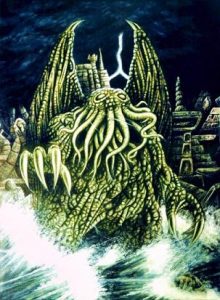This is mark Joseph “young” blog entry #146, on the subject of Chris and the Teleporting Spaceships.
I’ve told this story before; indeed, I wrote it up years ago for Dice Tales, and so I was reminded of it recently when I launched the Gazebos in the Wild Pinterest board in commemoration of that more famous Dice Tales story, Eric and the Gazebo. Alas, Dice Tales is long gone, and although Eric lives on as a meme among gamers, Chris is less familiar. So I thought it might be time to retell the tale.
I should also say that if any of my players remember any great stories of times in our games that need to be retold, they should drop me a note to remind me of them, and I’ll try to get them posted here.

It starts with Chris playing Multiverser as one of my original five test players. I was trying to test a lot of things about the game, like how well it adapted itself to other people’s material (we encourage referees to plagiarize settings and other materials for game play, simply because the game can devour world ideas and the books, movies, television shows, games, and other sources are free for you to use in your own home games), so I decided to have a “gather”, bringing the player characters together, in an old game I always loved, Metamorphosis Alpha. I had brought Chris there, and he had gathered a couple of followers by then, so he was something of a team.
It occurs to me that Tristan, at that time the youngest person ever to have played the game (I believe he was seven or eight), was one of the other original test players, and his character had attached himself to Chris’s. Since Multiverser is an “I game”, the characters and players have the same names; I’ll try to keep them straight for you.
The basic concept of Metamorphosis Alpha was that earth had sent a huge colony ship out toward what they hoped would be a suitable colony world. There were millions of people aboard, and facilities that imitated outdoor parks, huge apartment complexes, and much more. At some point the ship passed through an unanticipated cloud of an unknown type of radiation, killing millions of people and mutating many more, and the ship, now with only computer guidance, continued its trip through space, passing the original destination with no one at the helm. However, there were generations of humans, mutant humans, animals, mutant animals, plants, and mutant plants aboard, unaware that they were on a ship, forming new ecologies. If it sounds familiar, yes, Metamorphoses Alpha was the precursor to Gamma World, the original post-apocalyptic game, and introduced many of the concepts and mechanics that were found in early editions of that game. It was into this that I dropped my players.
Chris had also by this point learned and created a number of psionic skills, and was always looking to devise new ones. He was known to be a bit reckless sometimes in that regard, but the other players often gave him reason to exercise some caution.
I had decided to put an expiration date on the world, of sorts, or perhaps to create a problem that would require their ingenuity to solve. There was, at the top of the ship, an observation deck from which one could see space and some of the exterior of the ship, which would for the player characters explain where they were. To make it interesting, I positioned the ship (Starship Warden) in a place where it was headed directly toward one star, and near enough that it would be evident that they were on a collision course. They would have to figure out how to avoid this. Chris and Tristan were the players who reached the observation deck first, and Chris immediately recognized the problem and started considering how he might solve it. Not wanting to be rash, he decided to go away and come back the next day to try his idea once he had considered it.
What Chris wanted to do was teleport “the ship” forward to the other side of the star, so that it would bypass it completely. He wasn’t stupid about it, though–he decided to run a test. Taking his team, including Tristan, to the top deck, he prepared to test his idea by teleporting the ship forward ten feet. Tiny Tristan wrapped himself around tall Chris’ leg (he did this whenever Chris announced he was going to try something crazy and dangerous hoping to avoid being separated from him), and with a successful roll on the dice Chris moved the ship ten feet forward. It worked exactly as described: the ship shifted forward ten feet, but everything and everyone on it that was not part of it or securely attached to it was now ten feet aft of their previous positions. It was obvious that were he to teleport the ship to the other side of the star this way, he would leave himself and everyone else adrift in space here. It was time to return to the drawing board. It wasn’t a useless skill, and it was added to his character sheet, but it wasn’t the solution he needed here.
He came back the next day with a different idea. As Tristan again clung to his leg, he opened a huge portal in front of the ship (it really was huge–the Warden was, if I recall correctly, twenty-five miles in diameter and football shaped) with an exit portal ten feet beyond it. The ship began to pass into the portal and, as if it were a wormhole, to pass out ten feet away; everything and everyone aboard was similarly carried into the portal and out the other side, so it worked perfectly. He had his solution, and it was added to his character sheet.
The next day he implemented it.
Chris never asked–I’m not sure he has ever asked even since–but I wasn’t really cruel. I had figured that if anyone had taken sightings and done the math they would have figured out that they had a year before they would actually crash into the star–a year during which the ship would have gained momentum as gravity pulled it ever closer. He had no idea how far from the star he was, so when he said he wanted the portal to open on the other side, I asked for some notion of where on the other side, and the answer he gave led me to understand that it was not really, in astronomical terms, far at all–maybe inside one astronomical unit. So I let him teleport the ship to the other side of the star, but then informed him that he was really a lot closer to the star than he had been, and that gravity was slowing the ship’s forward momentum. In a panic, he teleported the ship again, a short hop, and then again, and then on the third attempt to move away from the star he botched and teleported the entire ship into the core of a planet. Everyone was dead, which of course in Multiverser means that all the player characters “verse out” and wind up in some other world. I don’t remember where he went, but he had some other wild adventures, and then I tested something else.
I had put a lot of time into pirating Blake’s 7, and figuring out how to put a verser into the episodes and remove Blake. I used this for two of my original test players, and Chris was one of them; he might have been the first one. He did very well for quite a while, until we got to an episode which seems to have something very like magic in it, a world in which there are ghosts on a planet who are tasked with teaching people lessons about fighting. It has a difficult set-up–I had to use three fast Federation ships under the command of Commander Travis to corner Chris with his back to this planet, and I had succeeded. In a moment I expected it would come to a direct combat confrontation, the ghosts would intervene, and Chris and Travis would find themselves on the planet being told by the ghosts what was expected of them. But Chris had not yet given up. He grabbed his character sheet, and said, “I know what I’m going to do. I know what I’m going to do.” He thumbed through to the psionic teleport skills, pointed to one of them, and said, “I’m going to do this.”
I may have cocked an eyebrow Spock-like; I do that sometimes. I asked if he was sure that’s what he wanted, and he was very confident. I asked him to describe the teleport target spot to me, and he gave me a position just to the other side of the three ships that had him trapped. I had him roll the dice.
“You succeeded,” I said.
“Yes!” he exclaimed.
“…and,” I continued, “you can see your ship adrift in space on the other side of the three Federation ships just before the vacuum of space kills you and all the members of your crew, and you leave for another world.
It was the wrong teleport spell, of course, but it was one of the most memorable moments in our games, and we have laughed about it for decades since then. I hope you enjoyed the story as much as we did.
[contact-form subject='[mark Joseph %26quot;young%26quot;’][contact-field label=’Name’ type=’name’ required=’1’/][contact-field label=’Email’ type=’email’ required=’1’/][contact-field label=’Website’ type=’url’/][contact-field label=’Comment: Note that this form will contact the author by e-mail; to post comments to the article, see below.’ type=’textarea’ required=’1’/][/contact-form]








